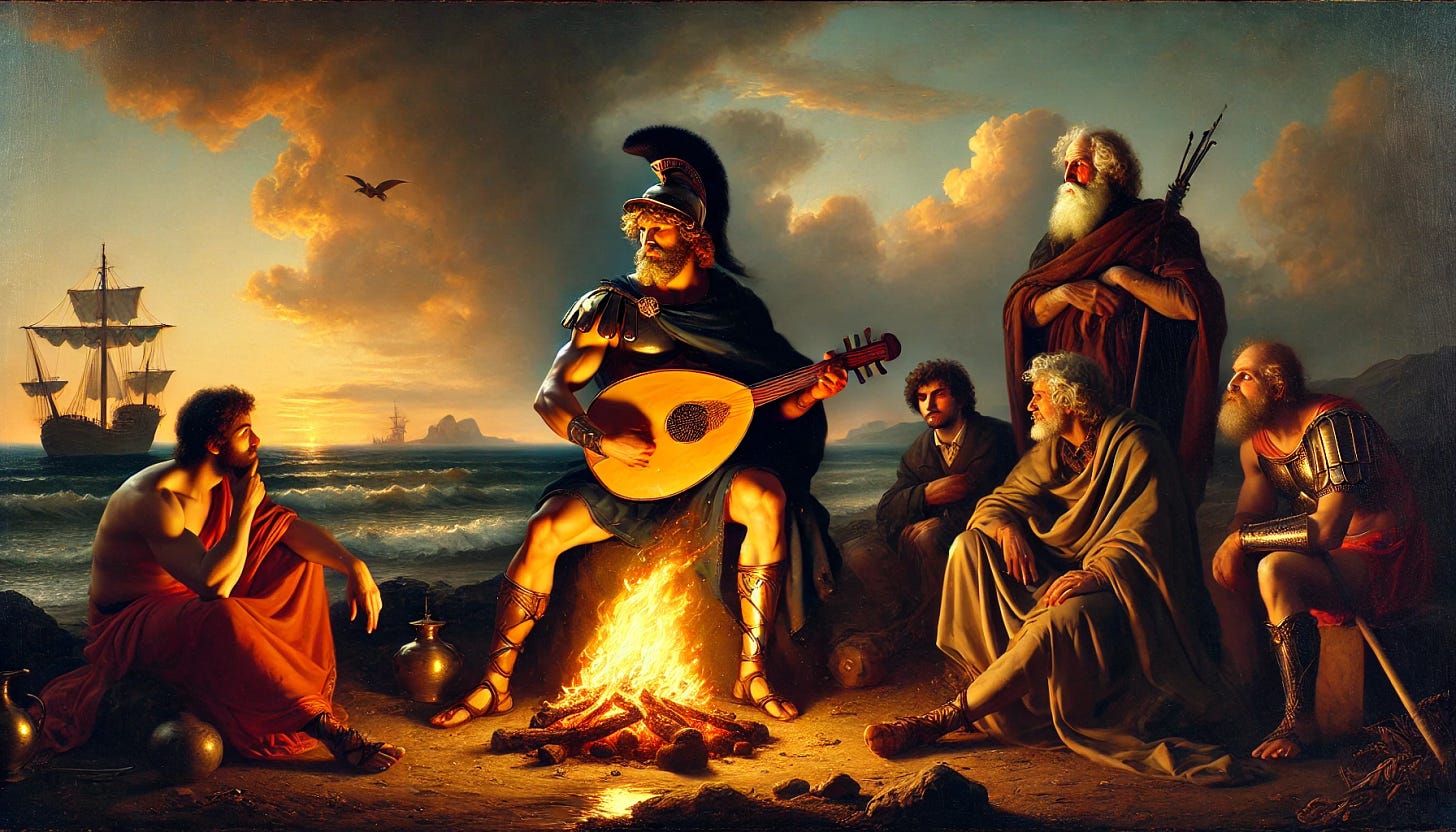Reading The Iliad for the First (or Hundredth) Time
How Rage, Honor, and Compassion Still Resonate in Our Modern World
Reading the Iliad for the first or hundredth time can feel like stepping onto a battlefield whose very dust and cries have shaped the centuries. Its opening line, “Sing, O goddess, the anger of Achilles,” sets the tone for all that follows: gods, heroes, and mortals swirling in a vortex of rage, honor, and empathy. Nearly three thousand years after it was composed, this ancient Greek epic still beckons us to examine the depths of human emotion in war and peace, to recognize a fledgling sense of individualism in Achilles’ defiance, and to marvel at how one poet, or perhaps several poets working across generations, crafted a living tapestry of myth that continues to intrigue us. The Iliad is so foundational that one often hears it likened to the “Bible” of ancient Greece. That may be an overstatement, but it captures a kernel of truth: Homer’s verses were the source of moral, literary, and cultural education for generations of Greeks, and by extension, for much of Western civilization thereafter.
For many readers, there is a dramatic difference between reading the Iliad as a child and revisiting it as an adult. There is a story told of a precocious nine-year-old who once attempted to read the epic after being promised it was the “greatest book of all time.” The child cried at every page, baffled by the archaic language and the litany of unfamiliar names. Such tears, though perhaps disheartening, demonstrate the magnitude of Homer’s poem; it is not a text to be trifled with lightly. And yet, by the time that same reader had reached early adulthood, returning to the epic felt like encountering an old friend. The once-impenetrable lists of warriors gave way to the poignant storylines beneath: Achilles wrestling with mortality, Hector torn between duty and family, Priam braving the grief that only a father of fifty sons might know. The shift from tears to comprehension, from bafflement to recognition, underscores how the Iliad reveals new dimensions of meaning depending on a reader’s stage in life.
There is a timeless quality to Achilles’ dilemma, central to the poem’s tension. The prophecy that he will die if he continues to fight at Troy, yet be rewarded with eternal fame, forces him to confront a stark choice between glory and life. In Book 9, he tells Odysseus and the others who come to persuade him, “I carry two sorts of destiny with me… If I stay here and fight, I shall not return alive but my name shall live forever.” That assertion, so purely expressed, brims with the earliest whispers of individuality in Western literature. It is not that Achilles is trying to save Greece or to uphold some grand notion of patriotism; he is weighing his own honor, his own life, and his own legacy above all else. That perspective—“I am not killing for you anymore,” as one might paraphrase—transforms him from a mere instrument of war into a thinking, self-asserting man. Modern readers who labor under the assumption that ancient heroes are little more than sword-wielding strongmen may be surprised to find, in Achilles, the stirring of what we recognize today as personal agency and interiority.
Yet if Achilles occupies the stage in luminous armor (or, at one point, literally no armor, appearing like a blazing god to halt the Trojan advance), Hector provides the counterpoise. Homer is remarkably generous to both sides of the war; there is as much pathos in Hector’s farewell to Andromache in Book 6—where he cradles his infant son, who shrinks in terror from his father’s gleaming plumes—as in any Greek soldier’s lament. One of the compelling aspects of the poem is that Homer invests a sense of individuality in nearly every fallen warrior, even minor characters who suffer a single spear-thrust. Readers sometimes call these “kill of the week” moments, because each kill is described with a grisly flourish: eyes spilling onto the ground, or spears snapping ribs with a sickening crack. Such gore can feel excessive, but the net effect is to force upon us the realization that every fallen soldier has a name, a home, and a life that has ended. This kind of universalizing compassion is leagues removed from a simplistic “us versus them” narrative. Homer ensures that every death, no matter how insignificant in the grand strategy, carries an emotional weight.
This emotional breadth is echoed in the poem’s final book, when King Priam of Troy slips into Achilles’ tent under cover of darkness to beg for the body of his son, Hector. Homer, who began with a call to sing of Achilles’ anger, now demands that we witness Achilles in a moment of profound empathy. In one of the epic’s most moving scenes, Priam invokes the memory of Achilles’ own father, Peleus. “Remember your father,” Priam urges, “and pity me.” That single command vaults beyond the confines of Trojan and Greek, mortal and half-immortal, soldier and king. By appealing to Achilles’ sense of familial love, Priam breaks through that wrath to reveal a deep wellspring of shared humanity. In the transcript of a recent discussion, a teacher recounted the varied translations of this scene, particularly focusing on how some versions highlight Achilles’ potential for self-harm upon hearing Patroclus has fallen, and how, in others, Achilles’ compassion is catalyzed by recalling his father’s inevitable grief. The core takeaway remains constant: empathy, even for one’s enemy, transcends all lesser urges.
In reading such works, one naturally wishes for cultural context, which is why experiencing the era’s art—its pottery, sculpture, and architecture—amplifies our understanding. A teacher specializing in visual arts once noted how the ancient Greeks depicted scenes from the Trojan War on their vases and kraters, from the apple of discord to the forging of Achilles’ new shield. In a culture that thrived on oral storytelling long before the widespread use of the written word, these images functioned like storyboards. Even children, gathered around the household hearth, would have recognized the great heroes of the war. For them, the moment Achilles meets Priam, or the moment Hector bids farewell to his wife, were as familiar as any modern child’s fairy tale. Thus, when we immerse ourselves not only in the text but also in the sculptures, paintings, and artifacts that reflect these narratives, we come closer to a holistic appreciation of how an entire civilization understood itself.
And yet, the Iliad is not a history textbook. Homer chooses to focus on but a few weeks of a ten-year war, leaving out the famous Trojan Horse altogether. Children discovering the poem for the first time often wait expectantly for that fabled structure to appear, only to reach the final line—“Thus they performed the funeral rites of Hector, tamer of horses”—and wonder if they have a missing chapter. But that abrupt ending is precisely what makes the poem so compelling. Homer was not just recording events; he was crafting a narrative, one that is carefully shaped around Achilles’ wrath, personal loss, and final gesture of clemency. As a result, there is a unity to the Iliad that might feel missing if it were merely a catalog of the entire war. Here, everything revolves around emotion, choice, and how the greatest warrior can drive or withhold the war’s momentum.
Revisiting the Iliad may also prompt reflection on modern war stories and how they portray courage, camaraderie, and loss. A reader who delves into Band of Brothers or similarly vivid accounts might find a surprising kinship with Homer’s depictions of battlefield chaos and brotherhood. The Iliad presents a stark reality: war is brutal, war destroys, but war also unites men in bonds of trust and sacrifice that can be found nowhere else. Patrick Shaw-Stewart, a poet from the First World War, famously composed lines referencing “flame-capped Achilles,” drawing a direct parallel between ancient battles and the trenches of modern Europe. Across millennia, soldiers have gazed at the same reflection in Homer’s lines and found in them both warning and solace.
There is a reason that literate societies return to these verses again and again, whether for the first or the hundredth time. Each encounter peels back another layer of the poem’s complexity. The first reading might leave a person breathless with the spectacle of war and immortal gods striding the battlefield. A later reading might reveal the undercurrents of individual agency in Achilles’ stance and the heartbreak of Hector’s plight. And for those who read it yet again, a deeper sympathy arises for Priam, whose stooped figure in Book 24 becomes a testament to enduring grief and the power of supplication. The Iliad is a tapestry of emotions that can only be fully appreciated by those willing to look at it from different angles over the course of a lifetime.
Despite scholarly debates over whether Homer was one person or a collective tradition, the poem itself endures as a living conversation between modern readers and ancient voices. In the words of the classical scholar E. V. Rieu, “Homer opens his arms to all civilized peoples, and in reading him they all become Greeks.” The simplest motivation to embark on—or return to—this epic is that it grants us a glimpse into a distant era’s art, mindset, and moral codes, while also prompting us to reflect on our own. It is not mere antiquarian curiosity, but the pleasure of discovering that human nature has always been as complex and vibrant as Achilles’ fiery spirit, that fury and love can coexist within the same heart, and that empathy can persist in the darkest of wars.
One might begin reading with the notion that the Iliad is simply about the Trojan War, but soon realizes that Homer’s tale runs deeper: it is about the universal predicament of loving life so deeply that we fear its loss, but loving honor so fiercely that we risk all for it. It is about discovering what drives us to fight, and what compels us to cease. Above all, it reminds us that even those consumed by rage are not beyond the reach of pity, nor are we beyond seeing our enemies as fragile and beloved to someone. Reading the Iliad for the first or the hundredth time means beholding anew the majestic interplay of wrath and compassion, the interplay that has shaped centuries of readers and will continue to shape those yet to come.
WATCH MY DISCUSSION WITH ART EXPERT LUC TRAVERS ON THE ILIAD:
OR LISTEN TO THE PODCAST WHEREVER YOU GET PODCASTS.



